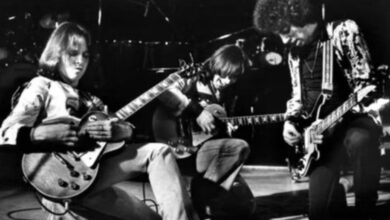Bobby Darin’s “Splish Splash”: The Playful Dare That Launched a Legend
Bobby Darin’s “Splish Splash” didn’t just arrive in 1958—it burst into American living rooms like a practical joke that turned into a career. The song’s gleeful premise and brisk, two-minute sprint made it feel like a TV-ready short film, and Darin leaned into the moment with showman’s flair, all swaggering smiles and precision timing. Audiences sensed an entertainer who could sing, move, and sell a punchline without breaking the beat.
The origin story reads like classic showbiz folklore: a New York disc jockey, Murray the K, teased Darin that he couldn’t write a hit that opened with the words “Splish splash, I was takin’ a bath.” Darin took the dare. Murray’s mother tossed in the spark of the line, and the resulting credit cleverly appeared as “Jean Murray” to sidestep payola suspicions. The prankish bet became a breakout.
When Darin stepped into Atlantic Studios that April evening, the track’s personality was already baked in, but the musicians made it crackle. A tight studio band punched out the backbeat, a slinky tenor sax rode the groove, and guitars snapped like fingers on two and four. It sounded like a party happening mid-take, a perfect fit for television’s rising appetite for youthful spectacle.
The recording’s arrangement deployed economy as a weapon—no wasted bars, no indulgent solos—just a brisk story that escalates from quiet bath to full-blown bash. You can almost see the bathroom door swing open with every snare hit. The sax shouts, the rhythm section struts, and Darin narrates the mayhem with a wink that never leaves his voice.
Lyrically, the song is a tour through the jukebox of 1958. Darin sprinkles in nods to “Peggy Sue,” “Good Golly Miss Molly,” and “Lollipop,” collapsing an entire teen-pop universe into one frantic house party. Those references weren’t tossed in for novelty alone—they placed Darin in conversation with the rockers of his generation while showing he could out-charm them all on camera.
Released that May by Atco, “Splish Splash” raced up the charts and instantly marked Darin as a star. It was a rare crossover that worked on pop radio, rhythm-and-blues surveys, and—even more surprisingly—the country rankings. The record’s momentum told agents and TV producers something simple: book this kid and point a camera at him; he’ll do the rest.
Television was the accelerant. On Dick Clark’s Saturday night showcase, Darin’s physicality made the single feel bigger than a seven-inch disc. He clapped, mugged, and played to the lens with controlled mischief, turning a novelty lyric into a performance piece. The audience didn’t just hear “Splish Splash”—they watched it unfold, like sketch comedy set to a rock-and-roll backbeat.
Those TV appearances also taught viewers what kind of performer Darin was. He wasn’t merely a singer who found a catchy hook; he was a multi-genre pro who could sell swing, croon a ballad, and still get kids dancing on a Saturday night. In an era when television could crown a national favorite within weeks, “Splish Splash” was the perfect audition tape.
The session players deserve their curtain call. The tenor sax lines give the record its comic-book exclamation points, while the guitars keep the track lean and bouncing. The drums snap with dance-floor authority, tight yet playful, leaving just enough space for Darin to ride the pocket. The whole arrangement is a masterclass in doing more with less.
As a piece of pop storytelling, the song holds up because the humor is physical and cinematic. The listener can picture the puddles, the startled step back, the door to the living room, the sudden crowd, the chorus of names. Darin’s voice acts like a camera pan; every phrase cues a new angle, and the band cuts like an editor.
Commercially, the single’s performance was astonishing for a debut smash. It climbed into the top tier of the charts and stayed there long enough to prove it wasn’t a novelty fluke. By the time summer turned to fall, “Splish Splash” had minted Darin as a bankable headliner, the kind promoters could place on any bill without fear of audience letdown.
The success also reframed Darin’s ambitions. With “Splish Splash” as the door-opener, he moved—almost audaciously—into sophisticated pop and jazz, scoring with “Dream Lover,” then conquering with “Mack the Knife.” That pivot made later critics misread his teen hit as a disposable trifle; in truth, it was the launchpad that showed he could command any room.
Onstage, the song kept its power because it gave Darin a reliable shot of kinetic energy in the setlist. Audiences anticipated the wink on the opening line and the burst of rhythm that followed. He could play it early to break the ice or near the end to send people home grinning; either way, it never failed to feel fresh.
What’s striking, decades later, is how modern the record sounds in miniature. The short runtime, the clear hook, the visual storytelling—it all anticipates the pop grammar that television and later music videos would amplify. Darin didn’t need lavish staging; he brought the staging with him, through gesture, timing, and precision phrasing.
Culturally, “Splish Splash” survives because it captures a transitional America: rock ’n’ roll still rebellious, television newly dominant, youth culture learning to see itself on screen. It’s a snapshot of 1958 that still plays, the sonic equivalent of a crisp black-and-white photo: all motion, all grin, all momentum.
And so the legend endures. A dare became a lyric, a lyric a studio date, a studio date a chart storm, and a chart storm the first act of a restless, shape-shifting career. “Splish Splash” is more than a charming relic—it’s the sound of Bobby Darin figuring out, in real time, that the stage belonged to him.
Sources for factual details (recording, credits, dates, chart peaks, and TV appearances): Wikipedia’s “Splish Splash (song)” page; BobbyDarin.net chart listings and session notes; Dick Clark Saturday Night Beechnut Show listings at ThisIsBobbyDarin.wordpress.com; Bobby Darin album entry; and People magazine’s career overview. Bobby Darin: The Brief, Blazing Life of the Tragic Teen Idol Who Knew He’d Die Young”.



